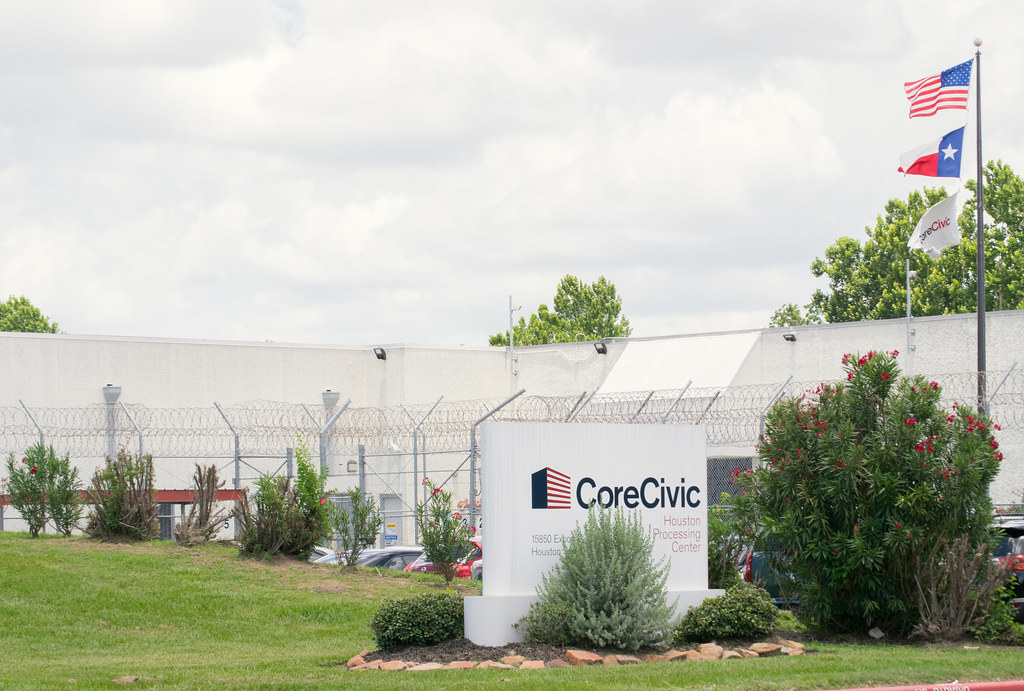New Jersey is a Social Justice State: Activism in the Fight Against the Elizabeth Detention Center
A single private immigration detention center is at the center of a nationwide legal battle. The Elizabeth Detention Center in New Jersey has become a microcosm of the dual demands of immigrant justice activists at the state and federal level versus the Biden Administration. The legal battle thus far has not had the result activists are hoping for, but it has shown the strength of New Jersey’s social justice community.

A CoreCivic processing center location in Houston. Image Credit: Patrick Feller via Flickr.
Two miles from Newark Liberty International Airport and a 20-minute train ride from Penn Station in New York City lies the Elizabeth Detention Center (EDC). The former industrial warehouse houses anywhere from 150 to 300 migrants on a given day. Viewed as a gateway to the American Dream, migrants instead experience a living American nightmare. The private immigration detention center in the state was meant to be phased out in 2021 when New Jersey Governor Phil Murphy signed into law AB 5207, which prohibits new or renewed contracts for all private immigration detention facilities and those within county jails. Almost immediately, county jails closed down their immigration detention centers. However, CoreCivic, the main private player in immigration detention in the US, refused. Instead, they opted to laud a legal challenge against the state because their operations are contracted by Immigration and Customs Enforcement (ICE). ICE is a federal agency, and they do not fall under the purview of the state legislature.
CoreCivic, Inc. v. Murphy, the state’s case to defend AB 5207, has grown to include a large activist movement spearheaded by groups and individuals based in New Jersey and New York. They are all pushing to support the state’s case against CoreCivic by submitting Amicus briefs and frontline work at the Elizabeth Detention Center. The fight against the last outpost of immigration detention in the New York City Metropolitan area proves the vitality of activism in New Jersey and the overwhelming opposition to the growing usage of immigration detention.
Emergence of the Amicus Briefs
The vibrant activist community in New Jersey is behind two key Amicus briefs to support the state’s case against CoreCivic. Amicus briefs play a crucial role in the legal process within the US. They inform judges of the context surrounding a case, providing alternative perspectives that are not usually present in the courtroom, which helps inform judge decision-making. The law firm Pashman Stein Walder Hayden created the first brief at the behest of Pax Christi USA, the Catholic peace movement. This brief focuses on the long-standing federal record of unsafe conditions in privately run detention facilities. Per the brief, “in most key areas, contract prisons incurred more safety and security incidents per capita than comparable Bureau of Prisons (BOP) institutions.” This is undoubtedly the case for the EDC. Detention center staff “cut corners and people suffer[ed]” because “business is good when they are arresting more people,” said Yanet Candelario, a former detainee turned immigrant justice advocate. Profit is placed above people’s well-being. Candelario talked about how the detention center consistently denied fellow detainees medical attention and how the mandatory meals with protein went from every two weeks to every few months. The Pashman Stein Walder Hayden brief adds to Candelario’s testimony by illustrating a nationwide trend of “‘private prisons’ profit motive” above all other considerations. Beyond illustrating dangerous conditions in detention centers, the brief also pushes back against CoreCivic’s case, contending that “the State’s traditional police powers to protect the health and safety of those whom the federal government chooses to detain in New Jersey under its immigration authority” are grounds for the law’s implementation.
The ACLU of New Jersey submitted a second amicus brief. When discussing the second amicus brief, staff attorney Molly Linhorst described it as collaborative, aiming to represent the community’s voice. The ACLU of New Jersey’s brief was created with the assistance of 28 New Jersey-based activist organizations, including notable immigrant justice groups such as First Friends of New Jersey and New York, New Jersey Alliance for Immigrant Justice, and New Jersey Consortium for Immigrant Children. Community inclusion is critical in the CoreCivic v Murphy case; as Linhorst explained, AB 5207 “came from zealous advocacy of community organizations.” In addition, the law firm Gibbons P.C. played an important role in creating the briefs. The ACLU’s brief emphasizes public health and safety—both of which they contend lie well within the police powers of the state per the US Constitution. The brief also highlights that detention centers can worsen public health crises in surrounding communities. Zeroing in on the COVID-19 pandemic, the brief contends that “communities with immigration detention facilities faced a significantly higher likelihood of early cases and serious outbreaks.” This phenomenon is not unique to COVID-19. The brief goes on to further state, “an outbreak of the mumps among people in ICE detention at the Bergen County Jail in 2019” created a cause for concern among public health experts in New Jersey. The ACLU brief effectively shows the harms that arise from the mere existence of an immigration detention center, solidifying the argument that its operations lie well within the powers of the state.

The Significance of CoreCivic v Murphy
“It’s too early to know” where the case will go, Linhorst said, especially as we continue to await the release of CoreCivic’s Amicus briefs. However, the significance of this case and the law it aims to uphold cannot be understated. The EDC has been a flashpoint for immigrant justice advocates on the East Coast for years, and it has often acted as a symbol for politicians and activists alike who are arguing for immigration reform in the US. The journey to AB 5207 has not been a seamless one. Kathy O’Leary of PaxChristi said of the law’s original passage, “I never expected the EDC to close in my lifetime.” The attempt to close private immigration detention centers in New Jersey marks unexpected radical progress. This case will be decisive in setting a precedent for the limits of state governments to regulate what it views as predatory immigration policies endorsed by the Federal Government. Similar laws passed in California also face lengthy legal battles, inhibiting their ability to shut down private detention centers. The Amicus briefs add weight to the New Jersey case, which is incomparable to other examples in the US, given the relevance of the EDC in national debates on US immigration policy. Closing the EDC has been the raison d’être of activist groups in New Jersey for decades. It is because of their tireless efforts and grassroots organizing that Governor Murphy has broken from other democratic leaders. New Jersey is a pro-social justice state, and for activists in the state, the fight will not end until the day the EDC closes its doors for good.
What the Future Holds
The origins of AB 5207 inform the future of the fight to close the EDC. It all hinges on activism. We “can’t lose sight of the people caught up in the system,” O’Leary said. The stories of Yanet Candelario’s activism since leaving detention and starting the Mami Chelo Foundation prove the vitality of immigrants who are victims of a system designed to break them down. In the coming months, we can expect the release of CoreCivic’s Amicus briefs, which are likely to include a voice of support from the Biden administration, which has been an ardent supporter of keeping the center open since the passage of AB 5207. In more troubling news, as AB 5207 awaits a final decision, it can’t be enforced. ICE has already sent out a call for new contract opportunities, which includes pre-solicitation notices, solicitation notices, award notices, and sole source notices. It is actively looking to expand immigration detention in New Jersey, a move that would greatly threaten the power of advocacy efforts that have previously only had to worry about one ICE facility in the whole state. Even if the state is successful in its case against CoreCivic, brand new contracts would likely have to be seen to their conclusion if they are agreed to before a successful ruling in favor of AB 5207. Despite this, hope is not lost. Activists in New Jersey have proven their passion for public organizing and the power of the public’s voice in creating tangible government action. CoreCivic v Murphy will not be the end of the road for immigration justice activists in the state, but merely another stop along the way where they can show the power of community organizing.

Cameron Roberts (she/her) is a managing editor for the JPI academic journal and a columnist for the JPI online magazine. She is an undergraduate sophomore at NYU in the Global Liberal Studies program, concentrating on Politics, Rights, and Development. Her academic and research interests lie in issues related to migration policy in the Mediterranean region and conflict within the Middle East and North Africa. Outside of JPI, she manages NYU’s branch of the Sycamore Institute and is a Liberal Studies Student Leader. She enjoys indoor cycling and trying new restaurants around New York in her free time.







